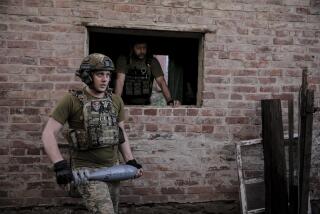Editorial: Another front in the war on Islamic State, and still no legal authority
- Share via
In launching airstrikes in Libya this week, the Obama administration opened a new chapter in its campaign to “degrade and ultimately destroy” Islamic State. But even as that war expands, it continues to be waged under authority granted by Congress more than a decade ago for a very different purpose. If this military campaign is to continue, it is vital that Congress explicitly authorize it and place limits on its extent and duration.
This week’s strikes by U.S. drones and attack jets targeted Islamic State positions in the city of Surt on the Mediterranean coast, from which Libyan government forces are attempting to dislodge the terrorist group. Though not the first American airstrikes in Libya, this week’s missions are the inauguration of what Pentagon officials called an open-ended effort to secure Surt. It amounts to a major escalation.
If one accepts the administration’s insistence that the U.S. must take on Islamic State — and we do, though we have opposed the deployment of U.S. ground troops — it’s difficult to argue that Libya should be off-limits. But it’s outrageous that this war has been fought for almost two years without explicit approval by Congress.
Congressional approval is necessary not only because the Constitution requires it but also because waging war is a fateful decision that shouldn’t be made by the president alone. Moreover, formal consideration of a new Authorization for Use of Military Force would require the administration to articulate and define its objectives.
In February of 2015 — five months after he launched a “steady, relentless effort” to defeat Islamic State — President Obama proposed that Congress approve a new AUMF targeting that so-called caliphate and “associated persons or forces” for a three-year period. The authorization wouldn’t permit the use of U.S. forces in “enduring offensive ground combat operations” (a definition this page has criticized as overly loose).
But Congress hasn’t acted on the president’s request for an AUMF (or approved its own version), and Obama hasn’t found it necessary to expend much political capital on the issue. That’s because the administration has a fallback legal position. It maintains, unconvincingly, that the war is legal under two previous authorizations of force: one approved in 2001 in response to the Sept. 11 attacks and another in 2002 aimed at “the continuing threat posed by Iraq” — the Iraq ruled by Saddam Hussein, that is.
In June, Sen. Tim Kaine of Virginia, now the Democratic nominee for vice president, said: “Nearly two years into an executive war against [Islamic State], the unwillingness of this Congress to authorize the war not only shows a lack of resolve, it sets a dangerous precedent.” When Congress returns to work after Labor Day, it should rectify that dereliction of duty and pass a new AUMF.
Follow the Opinion section on Twitter @latimesopinion and Facebook
More to Read
A cure for the common opinion
Get thought-provoking perspectives with our weekly newsletter.
You may occasionally receive promotional content from the Los Angeles Times.






